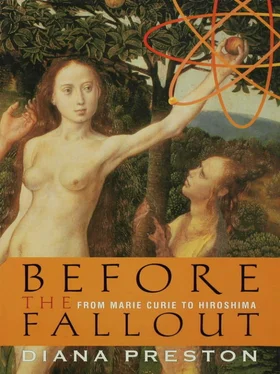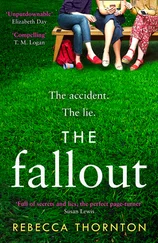Dirk Coster badgered the Dutch authorities to allow her in without passport or visa. Finally, on 11 July he learned that she would indeed be admitted to Holland. He left immediately for Berlin, where only a tiny inner circle knew Meitner was about to flee—among them Otto Hahn, Max von Laue, Paul Rosbaud, and Peter Debye, a Dutch physicist who was the director of the Kaiser Wilhelm Institute for Physics and had acted as a secret conduit for messages between Meitner and colleagues in Holland. Hahn helped Lise pack, and she spent her last night in Berlin at his house. As he recalled, “We agreed on a code telegram in which we would be let known whether the journey ended in success or failure. The danger consisted in the SS’s repeated passport-control of trains crossing the frontier. People trying to leave Germany were always being arrested on the train and brought back.”
On 13 July, Lise Meitner “left Germany forever—with 10 marks in my purse” and two small suitcases. She was wearing “a beautiful diamond ring” which had once belonged to Hahn’s mother and which he gave her as they parted because, he said, “I wanted her to be provided for in an emergency.” Paul Rosbaud drove her to the station. She was so frightened that at one stage she begged him to turn back, but she managed to pull herself together. Dirk Coster was waiting on the train. Greeting each other as if they had met by chance, they sat down together. The journey passed quietly, but as the train approached the Dutch border, Coster sensibly suggested that she give him the diamond ring in case it drew attention to her, and he tucked it discreetly into his waistcoat pocket. They crossed the border unhindered and by early evening were in Groningen. Lise Meitner felt in a state of shock, “uprooted from work, colleagues, income, and language, suspended between a past that was gone and a future that held nothing at all.”
Coster dispatched the prearranged telegram, reporting that the “baby” had been safely delivered, and Hahn sent “heartiest congratulations.” When Meitner’s fellow Austrian Wolfgang Pauli—the so-called Atomic Housing Officer—heard the news, he told Coster, “You have made yourself as famous for the abduction of Lise Meitner as for hafnium,” the element Coster had codiscovered in 1922 in Copenhagen and named after the city’s Latin appellation, Hafnia. The jocular remarks masked huge relief. Meitner had left with only hours to spare. Kurt Hess, the man so quick to denounce her, had alerted the authorities that she was planning to flee. Max von Laue later wrote to her of his thankfulness that “the shot that was to bring you down at the last minute missed you.”
• • •
Manne Siegbahn’s offer of a post in Stockholm was clearly Lise Meitner’s best hope of security. Dirk Coster, whose invitation to Holland had primarily been a device to help her escape from Germany, urged Siegbahn to complete the outstanding formalities quickly. Meitner finally arrived in Sweden in August 1938 after spending some time with the ever-hospitable Bohrs. She wrote to Coster, “One dare not look back, one cannot look forward.” At the same time she worried about friends and family still trapped in Germany and Austria.
Despite her eminence, Meitner discovered she was to be paid less than the starting salary of an assistant. Indeed, she was so poor that she could barely pay for room, meals, and small daily expenses. Yet poverty mattered less than the loss of facilities to carry on with her work. She wrote miserably to Hahn that she had “no position that would entitle me to anything.” She asked him to imagine how he would feel if he had a room at the institute that “wasn’t your own, without any help, without any rights and with the attitude of Siegbahn who loves only big machines and who is very confident and self-assured—and there I am with my inner shyness and embarrassment.”
Hahn, meanwhile, was doing what he could to have her possessions sent on to her, although his personal position was difficult. His name had appeared in a list of dismissed Jewish academics included on a traveling anti-Semitic exhibition, The Eternal few, designed to disgust the onlooker with examples of supposed “Jewish” physical characteristics and alleged “Jewish” moral depravity. Hahn had had to submit fresh affidavits to convince the authorities of his Aryan roots. The more he tried to do on Lise Meitner’s behalf, the more he risked attracting further unwelcome attention and suspicions. Yet, stressful though it was, he persisted, arguing with the Education Ministry, which at first insisted that everything Meitner owned must stay in Germany. Her clothes finally arrived in October, although she had to pay heavy customs dues. However, when her remaining possessions finally reached Stockholm, she found her furniture in splinters, her china smashed, and her books ripped apart—a final act of petty malice by the Nazi authorities.
In November 1938 she was at least able to see Otto Hahn again when both were invited to Niels Bohr’s institute in Copenhagen. She was waiting on the platform for Hahn as his train drew in, but their reunion was sad rather than joyful, for he brought disturbing news. Meitner’s brother-in-law, Otto Frisch’s father, who was still living in Vienna with his wife, Lise’s sister, had just been arrested. He had been rounded up with thousands of Jewish men in the aftermath of the vicious government-inspired attack on Jews and Jewish property on the night of 9 November, remembered ever after as Kristallnacht —“crystal night”—for all the splintered glass left lying in the streets.
The distressed and desperately worried Meitner found some consolation in hearing about Hahn’s recent work. He updated her on his ongoing sparring with Irene Joliot-Curie over her mysterious substance—“curiosium”—and of his continuing efforts to prove her wrong. Hahn’s assistant, the chemist Fritz Strassmann, had convinced him not to be so dismissive of the French team’s work and to replicate some of their experiments. In so doing he and Strassmann had created what they firmly believed to be isotopes of radium. However, when they had attempted to use barium as a “carrier” to help extract the radium—the use of carrier chemicals to separate out substances produced by neutron bombardment had become a standard technique—they had found to their surprise that they could not separate the barium from the radium. Meitner listened carefully and then advised Hahn exactly what experiments to conduct to cross-check his findings.
Hahn returned to Berlin, keeping his meeting with Lise Meitner a closely guarded secret, but Strassmann understood precisely who was setting the agenda. He had a very high regard for the exiled physicist, whom he had always seen as the intellectual leader of their team. He also owed her a great deal. He had arrived at the institute in 1929, extremely poor but grateful just to be there, and prepared to work for almost nothing. In 1933, though reportedly so malnourished that he sometimes fainted from weakness, he had turned down a well-paid job in industry because it would have required him to join the Nazi Party, which he abhorred. Meitner had persuaded Hahn to find fifty marks a month out of a contingency fund to keep Strassmann going and eventually to appoint him as an assistant. Looking back on the events of late 1938, Strassmann wrote, “She urgently requested that these experiments be scrutinised very carefully and intensively one more time—Fortunately L. Meitner’s opinion and judgment carried so much weight with us in Berlin that the necessary control experiments were immediately undertaken.”
Lise Meitner meanwhile returned to Stockholm. Learning that her brother-in-law had been deported to the Dachau concentration camp and that his only chance of release was to emigrate, she tried desperately to get visas for the Frisches to come to Sweden. She felt like “a mechanical doll, going smilingly through the motions but with no real life inside,” and wrote to Hahn of her gratitude that work “forces me to collect my thoughts, which is not always easy.” In particular, she was eager to know what results Hahn and Strassmann were obtaining.
Читать дальше












